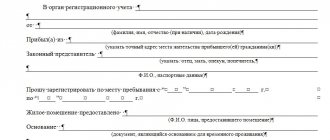What rights does a registered son have to an apartment if he refuses to participate in privatization?
The absence of a citizen who voluntarily left a residential premises for another place of residence, in the new place of residence, the right to use residential premises under a social tenancy agreement or the right of ownership of residential premises cannot in itself be a basis for recognizing the absence of this citizen in the disputed residential premises as temporary , since, according to Part 2 of Article 1 of the Housing Code of the Russian Federation, citizens, at their own discretion and in their own interests, exercise their housing rights.
A citizen’s intention to refuse to use residential premises under a social tenancy agreement can be confirmed by various evidence, including certain actions, collectively indicating such an expression of will of the citizen as a party to the residential tenancy agreement. The provisions of Part 4 of Article 31 of the Housing Code of the Russian Federation do not apply to former family members of the owner of a privatized residential premises, provided that at the time of privatization of this residential premises, these persons had equal rights to use this premises with the person who privatized it, unless otherwise established by law or agreement.
Login to the site
REVIEW
JUDICIAL PRACTICE OF THE SUPREME COURT OF THE RUSSIAN FEDERATION
FOR THE FOURTH QUARTER OF 2005
Will the right to indefinite use of residential premises be retained by a former family member of the owner of the residential premises, who refused to participate in the privatization of housing, when the ownership of the residential premises is transferred to another person, taking into account the provisions of Article 19 of the Federal Law “On the Enactment of the Housing Code of the Russian Federation” and Article 292 of the Civil Code of the Russian Federation?
Answer: Article 19 of the Federal Law “On the Entry into Force of the Housing Code of the Russian Federation” provides that the provisions of Part 4 of Article 31 of the Housing Code of the Russian Federation do not apply to former family members of the owner of a privatized residential premises, provided that at the time of privatization of this residential premises the specified persons had equal rights to use this premises with the person who privatized it, unless otherwise established by law or agreement.
It follows from Part 2 of Article 292 of the Civil Code of the Russian Federation that the transfer of ownership of a residential building or apartment to another person is the basis for termination of the right to use residential premises by family members of the previous owner, unless otherwise provided by law.
In accordance with Article 2 of the Law of the Russian Federation “On the privatization of housing stock in the Russian Federation”, citizens occupying residential premises in the state or municipal housing stock, including housing stock under the economic management of enterprises or the operational management of institutions (departmental fund) on social rental terms , has the right, with the consent of all adult family members living together, as well as minors aged 14 to 18 years, to acquire ownership of these residential premises.
The consent of the person who lives together with the owner of the residential premises is a prerequisite for privatization. It should be taken into account that, having given consent to the privatization of residential premises, the person proceeded from the fact that the right to use this residential premises for him would be of an indefinite nature, therefore, his rights must be taken into account when transferring ownership of the residential premises to another person, since a different interpretation would violate the provisions of Article 40 of the Constitution of the Russian Federation, according to which everyone has the right to housing and no one can be arbitrarily deprived of their home.
In accordance with Part 1 of Article 558 of the Civil Code of the Russian Federation, a list of persons who, in accordance with the law, retain the right to use residential premises after its acquisition by the buyer, indicating their rights to use the residential premises being sold, is an essential condition of the contract for the sale of a residential building, apartment, part of a residential building or apartment in which these persons live.
It follows from this rule that when alienating residential premises, the contract must indicate the right of the person who lives in it to use this residential premises; otherwise, the contract cannot be concluded, since an agreement has not been reached on all essential terms. Consequently, if a former member of the owner’s family at the time of privatization had equal rights with a person who subsequently acquired ownership of this residential premises, but refused privatization, giving consent to privatization to another person, then when the ownership of the residential premises is transferred to another person, he does not may be evicted from this residential premises, since he has the right to use this residential premises. In this case, it is necessary to proceed from the fact that the right of use is of an indefinite nature.
What rights does a person have if he refuses privatization of the apartment in which he lives?
It is important to remember here that once you have privatized, you cannot do it a second time. Typically, those who have hopes of receiving residential space from the state refuse privatization. These are, most often, military personnel and members of their families, those on a waiting list for new housing, and some other categories.
However, it is worth dwelling on one point. If a person did not participate in privatization, was deregistered and does not live in the apartment, but suddenly remembers his lost right, then his train, alas, has already left. It is clearly stated that those who refuse privatization retain the right of residence and use. Having been deregistered, out of habit we say “having been discharged,” a person loses his right.
Rights of those who refuse privatization
immediately before the transaction, the seller must create and provide the buyer with a package of documents for the apartment, including F9, which shows all registered persons. The buyer has the right to indicate to the seller his terms of the transaction, such as requirements to remove registered persons from the alienated residential premises
Those who refuse privatization can register minor children without the consent of others registered in the area, including the owners. The new owner will not be able to expel your father, provided that he actually lives in this apartment.
Consequences of refusal to privatize: what rights remain
In order to privatize real estate, the consent of all persons living in the given living space is required. It is important to know that only the votes of those registered in this apartment are taken into account. If one of the family members is against the privatization of real estate, then the procedure will not be carried out. If one of the residents refuses, the others do not lose the opportunity to register ownership. This is the difference between these two concepts.
Such occupants are considered encumbrances and may be noted on the title deed. In practice, after selling their home, they check out and move out. But can deregistration be regarded as a waiver of residence rights? Yes, if he is registered at a new place of residence, which was purchased for him by the owner to replace the one that was sold. That is, the right of perpetual use is automatically transferred to another property.
We recommend reading: Eviction of a registered person from a municipal apartment
Registration of refusal of privatization
Refusal from privatization can be formalized in several options, which are enshrined in Federal Law No. 1541-1, while each type of refusal carries a number of unique and individual outcomes that can in one way or another affect the fate of a citizen in later life.
In the case of selling a home, it is best to negotiate with the owner about compensation or provision of permanent registration in another residential premises, since sometimes life with new owners is difficult. A citizen can only renounce the right of residence and registration independently.
What is the right to use premises
As a rule, the desire to privatize housing arises from a family living in an apartment on the basis of a social tenancy agreement. In this case, the owner of the property is the municipality or the state.
Accordingly, the right to use residential premises arises from the moment of signing a social tenancy agreement with the municipality or state. It is a mistake to believe that it appears from the moment the apartment is re-registered as private property.
Refusal from privatization should occur on a voluntary basis. It is drawn up in the form of a special document and certified by a notary office. It is the notary who must verify the voluntariness of writing the refusal and certify the authenticity of the signature. This is necessary to minimize the presence of reasons for going to court.
A citizen who has refused privatization has the right:
- for permanent residence in residential premises;
- for permanent registration at the place of residence;
- to be freely present in any part of the residential premises;
- for the use of communications, etc.
In other words, the lack of ownership of real estate will not in any way affect the right to use living space.
Revolution! Those who refuse privatization can now be discharged
The Supreme Court indicated that the superficial consideration of such cases by lower courts was incorrect, the established ban on the discharge of those who refused privatization and the preservation of their right to use an apartment (in fact, eternal) is contrary to the spirit of the law and cannot be absolute, which is completely contrary to previously existing practice and makes it possible fight for your rights and discharge an unscrupulous tenant.
Let me remind you of the history of the issue - until September 1, 2014, in the event that a person (as an example - your relative), at the time of privatization was registered (registered) in the apartment and refused privatization in favor of others registered (registered) in the apartment (as an example - in your favor), then the courts considered that, in accordance with Art. 19 of the Introductory Law to the Housing Code of the Russian Federation, it was impossible to discharge him onto the street, Art. 31 of the RF Housing Code* and 292 of the RF Civil Code* (see link at the end of this article) were not applied to him. This person, who refused privatization, was like an eternal burden on the apartment - he could not be discharged even if the owner changed!, not to mention the case when he is discharged for not living in the apartment, lack of family relations, etc.... - he was like an “immortal tenant”, it was impossible to do anything with him. The only thing that could rid the apartment of such an “eternal tenant” was his death or voluntary discharge (of course, as a rule, not for nothing.).
What options does a person have if he refuses registration?
The Law “On the Privatization of Housing Stock,” most of the articles of which have now lost force, establishes that privatization is carried out with the consent of all persons living in the premises. That is, refusal to register a share of property in ownership should be considered not as a refusal in principle, but precisely as consent to the privatization of housing by third parties also living in the apartment.
And this significantly distinguishes, for example, refusal of inheritance and refusal of privatization in one of the ways. In the first case, the person gets nothing. In the second, he receives the right to unlimited use of residential premises. This is enshrined in a number of legislative acts. In particular, in Art. Art. 83 Housing Code of the Russian Federation and 292 Civil Code of the Russian Federation.
Watch the video: Refusal of privatization. Lifetime right to reside in an apartment
Refusal of privatization//Lifetime right to reside in an apartment.
What are the consequences of refusal of privatization and the right of lifelong residence?
The statement of claim is filed with a district or city court of general jurisdiction. During the trial, it will be necessary to prove that despite the fact that the citizen has a residence permit at the address of the privatized apartment, he lives in a completely different place.
Every citizen living in municipal housing has the right to take part in the privatization of an apartment or refuse this right for any reason. However, in the latter case, you need to think carefully about everything before signing the document. This legal action has significant consequences. In this article we will understand the consequences of refusing privatization and the right of lifelong residence, which arises after signing the refusal paper.
Registration procedure
The very fact of living without ownership guarantees compliance with the rights of the registered person who refused privatization, but greatly complicates the process of transferring real estate to the full disposal of buyers after the purchase and sale transaction.
If there is a refusenik during the transfer of municipal housing to the disposal of: refusal of privatization and the right to lifelong residence. The first document is mandatory to complete privatization activities in favor of the remaining registered residents.
The waiver paper is prepared in a notary office with mandatory certification, after the issue of distribution of shares among the remaining registered citizens has been resolved.
The second is a waiver of the right to lifelong residence, a sample of which is best taken from a notary’s office; it is required only when planning further transactions with housing and the transfer of real estate to new owners.
Refusal from privatization: procedure and consequences
When submitting documents, citizens often encounter some difficulties. As a rule, difficulties arise if one of the persons living together refuses privatization. To register property, first of all, you need documents confirming that the premises are in use, passports of citizens registered in it. If minors live in the apartment, then it is necessary to present the decision of the guardianship and guardianship authority. All actions relating to the privatization of an apartment - transferring it into joint or sole ownership of someone - are carried out with the voluntary consent of all persons registered in it.
If one of the persons decides not to take advantage of the opportunity to obtain ownership of housing, it can be registered in the name of other citizens registered in it. The application must be certified by a notary. Refusal of privatization does not deprive citizens of the opportunity to use the premises. However, the law provides exceptions to this provision. So, according to Art. 31, part 4 of the Housing Code, in cases where family relations with the owner are terminated, the right of use is not retained, unless otherwise provided in the agreement.
We recommend reading: How to get free housing from the state
Bar Association "Legal Defense"
- home
- Articles
- Right of lifelong residence: refusal of privatization - legal consequences
It would seem that every Russian should be interested in the privatization of property, since in the event of its privatization, real estate becomes the property of citizens, which allows the property to be disposed of in various ways.
In particular, privatized real estate can be sold by the owner subject to the conditions stipulated by Russian legislation. In addition, changes in the marital status of persons living in a privatized apartment may occur, due to which they lose family relationships with each other. Legal issues related to real estate are within the scope of our attorneys. High-quality lawyers at Legal Defense will help you protect your rights. We are waiting for your calls by phone. (495) 790-54-47.
The termination of family legal relations, which invariably gives rise to the division of property, leads to a dispute regarding the legality of the right of lifelong residence of a person who refused to participate in privatization and agreed to its implementation. According to the general rule of housing legislation, in the event of termination of family relations with the owner of a residential premises, the right to use this residential premises for a former family member of the owner of this residential premises is not retained and the former family member can be evicted at the request of the owner based on a court decision. At the same time, the right of lifelong residence acquired as a result of refusal to participate in privatization provides certain advantages.
The condition for the preservation of the right is the potential opportunity for the person who refused privatization to take part in it, and, consequently, to become a full-fledged owner of privatized housing on an equal basis within a certain period of time. The consent of the person who lives together with the owner of the residential premises is a prerequisite for privatization. It should be taken into account that, having given consent to the privatization of residential premises, the person proceeded from the fact that the right to use this residential premises for him would be of an indefinite nature, therefore, his rights must be taken into account when terminating family relations with the owner of the privatized residential premises. It is precisely because of this circumstance that Russian courts take a position in the sense of which the right of lifelong residence is retained by a person upon termination of his family relationship with the owner of the property.
The second significant point that raises concerns about the safety of the right to lifelong use is the change of owner of the residential premises. We are talking about any alienation: purchase and sale, barter, donation, rent, inheritance. And in this case, the courts also take a position in favor of the “refusenik” - the right to use this residential premises for them will be of an indefinite nature and, therefore, it must be taken into account when transferring ownership of the residential premises on the appropriate basis to another person. Moreover, when selling privatized residential premises, an essential condition of the contract is to indicate in it the persons who, in accordance with the law, retain the right to use it after its acquisition by the buyer, indicating their rights to use the residential premises being sold in which these persons live. Failure to comply with this requirement entails the impossibility of concluding an agreement, since agreement has not been reached on all essential terms. However, in practice, there are cases when, despite the requirement of the law to indicate persons who have the perpetual right to use residential premises, an agreement is concluded.
Similarly, when transferring ownership of residential premises to another person, the issue of preserving the right to use this residential premises for a former family member of the owner of the residential premises, who previously exercised his right to privatize the residential premises, and then moved into another residential premises as a member, must be resolved. the tenant's family under a social tenancy agreement and, while living there, gave the consent necessary for the privatization of this residential premises.
Lawyers at Legal Defense have extensive experience in handling housing disputes in court. You can sign up for a consultation by calling: (495) 790-54-47.
Petrov Mikhail Igorevich © MOCA “Legal Protection”
How to refuse privatization and the right to lifelong residence
“It is unacceptable to apply clause 2 of Art. to owners of residential real estate. 292 of the Civil Legislation, since the person who refused to participate in the transfer of residential premises under the right of personal ownership, by his statement confirmed his consent to legally significant actions in relation to common housing for privatization, without which the fact of transfer would not have been feasible.
- the justification for the claim must be based on the voluntariness of the act, and if there is no written evidence of this point, then this can serve as an important circumstance for the court to consider claims for the return of their housing rights.
- Another good reason may be the permanent absence of a permanent resident from the place of registration. As evidence that you have the right to stay for any period convenient for you, you can indicate the fact that you were on a long business trip, or were undergoing a long-term treatment course in a medical institution.
Housing rights of citizens who refused to participate in housing privatization
HOME → Articles → Housing rights of citizens who refused to participate in the privatization of housing
When privatizing occupied residential premises, housing is transferred free of charge to citizens and members of their families on the basis of common shared ownership. At the same time, all participants in housing privatization become owners and acquire equal rights and responsibilities. Consequently, these citizens have the same housing rights to privatized housing; derogation of the housing rights of some owners in favor of others is unacceptable.
In practice, cases have become widespread when some members of the tenant's family living together with him refuse to participate in the privatization of housing, but agree to its implementation in favor of other persons. In this case, citizens who did not become owners through privatization retain the right of indefinite residence.
However, the exercise of housing rights by a citizen who refused to participate in privatization and agreed to its implementation, becoming a former member of the owner’s family, is controversial.
According to the general rule of housing legislation, a former family member can be evicted at the request of the owner based on a court decision. This legal norm is established in Part 4 of Art. 31 of the Housing Code of the Russian Federation, on the basis of which, in the event of termination of family relations with the owner of a residential premises, the right to use this residential premises for a former family member of the owner of this residential premises is not retained, unless otherwise established by an agreement between the owner and the former member of his family. If a former family member of the owner of a residential premises has no grounds for acquiring or exercising the right to use another residential premises, and also if the property status of a former family member of the owner of a residential premises and other noteworthy circumstances do not allow him to provide himself with another residential premises, the right to use the residential premises owned by the specified owner may be retained by a former member of his family for a certain period based on a court decision. In this case, the court has the right to oblige the owner of the residential premises to provide other residential premises for the ex-spouse and other members of his family, in whose favor the owner fulfills alimony obligations, at their request.
According to Art. 19 of the Federal Law of December 29, 2004 “On the entry into force of the Housing Code of the Russian Federation”, the provisions of Part 4 of Article 31 of the Housing Code of the Russian Federation do not apply to former family members of the owner of a privatized residential premises, provided that at the time of privatization of this residential premises the specified persons had equal rights to use this premises with the person who privatized it, unless otherwise established by law or agreement.
In other words, a person registered in a disputed residential premises and who refused to privatize this housing cannot be evicted subsequently either at the claim of the owners - former members of his family, or at the claim of the new owner. This is a general rule.
Grounds for recognizing a person who refuses to participate in the privatization of housing as having lost the right to use residential premises
There are often cases when a person who has declared a refusal to participate in the privatization of a residential premises does not intend to live in it, as is clearly evidenced by the body of evidence: actual non-residence in the disputed apartment for a long time, non-payment of housing and communal services, absence of things in the disputed apartment, belonging to this person, the presence of other housing. These circumstances indicate that the person has no interest in using the disputed housing.
Moreover, a legally significant, essential circumstance in the case of recognizing such a person as having lost the right to use residential premises is the fact of non-residence in the disputed residential premises at the time of its privatization, that is, the actual refusal of the right to use the disputed residential premises.
JUDICIAL PRACTICE OF RECOGNIZING A PERSON WHO REFUSES PRIVATIZATION HAS LOST THE RIGHT TO USE RESIDENTIAL PREMISES
K. filed a lawsuit against her ex-husband for eviction without providing another living space, citing the fact that in 1987 the plaintiff, her mother and the plaintiff’s minor daughter were provided with a two-room apartment in the city of Pitkäranta. In 1993, the plaintiff registered the defendant in the disputed apartment. On October 18, 2002, the plaintiff registered the disputed apartment as her property through privatization. The defendant refused to participate in privatization. The plaintiff asked to evict the defendant from the said apartment without providing another living space, since he had not lived in the apartment for a long time and was not a member of her family. The plaintiff intends to dispose of her property. The Pitkyaranta City Court rejected the claim. The Judicial Collegium for Civil Cases of the Supreme Court of the Republic of Karelia found no grounds for overturning the court's decision, stating the following. As follows from the case materials, the defendant has been registered in the disputed apartment since 1993. In 2002, the plaintiff privatized the disputed apartment, which is confirmed by an agreement on the free transfer of residential premises into ownership. At the time of privatization of the apartment, the defendant was registered and lived in the apartment, but refused to participate in the privatization, as evidenced by his signature in the application for the transfer of ownership of housing. Currently, the plaintiff is the sole owner of the disputed apartment, which she received into ownership through privatization, which is confirmed by a certificate of state registration of rights. Under such circumstances, the court reasonably concluded that the defendant cannot be evicted from the disputed apartment in accordance with Art. 31, clause 4, Housing Code of the Russian Federation, since at the time of privatization he had equal rights with the plaintiff to use residential premises.
An important issue is the exercise of housing rights by a citizen who has refused to participate in the privatization of residential premises and has given consent to its implementation when transferring ownership of this privatized residential premises.
According to the provisions of Part 2 of Art. 292 of the Civil Code of the Russian Federation provide that the transfer of ownership of a residential building or apartment to another person is the basis for termination of the right to use residential premises by family members of the previous owner, unless otherwise provided by law.
However, the Supreme Court of the Russian Federation, adhering to a different point of view, indicated that in accordance with Art. 19 of the Federal Law of December 29, 2004 N 189-FZ “On the implementation of the Housing Code of the Russian Federation” the effect of the provisions of Part 4 of Art. 31 of the Housing Code of the Russian Federation does not apply to former family members of the owner of a privatized residential premises, provided that at the time of privatization of this residential premises, these persons had equal rights to use this premises with the person who privatized it, unless otherwise established by law or agreement. According to Art. 2 of the Law of the Russian Federation of July 4, 1991 N 1541-1 “On the privatization of housing stock in the Russian Federation” citizens of the Russian Federation occupying residential premises under a social tenancy agreement in the state and municipal housing stock have the right, with the consent of all adult members living together families to acquire ownership of these premises on the terms provided for by the said Law and other regulations of the Russian Federation and constituent entities of the Russian Federation. As can be seen from the content of this rule of law, privatization of residential premises is possible only with the obligatory consent to privatization of all adult members of the tenant’s family, including former members of the tenant’s family (Part 4 of Article 69 of the Housing Code of the Russian Federation). This rule does not establish any exceptions for family members living with the tenant, including those who previously participated in the privatization of another residential premises. Consequently, upon termination of family relations with the owner of a privatized residential premises, the former member of the owner’s family, who exercised his right to free privatization, retains the right to use the privatized residential premises, since his consent was required for the privatization of this residential premises. This right to use the residential premises is retained by the former family member of the owner even when the ownership of the residential premises is transferred to another person [3].
The Supreme Court of the Russian Federation also determined that the consent of the person who lives together with the owner of the residential premises is a mandatory condition for privatization. It should be taken into account that, having given consent to the privatization of residential premises, the person proceeded from the fact that the right to use this residential premises for him would be of an indefinite nature, therefore, his rights must be taken into account when transferring ownership of the residential premises to another person, since a different interpretation would violate the provisions of Article 40 of the Constitution of the Russian Federation, according to which everyone has the right to housing and no one can be arbitrarily deprived of their home [4].
In paragraph 18 of the Resolution of the Plenum of the Supreme Court of the Russian Federation dated July 2, 2009 N 14 “On some issues that have arisen in judicial practice when applying the Housing Code of the Russian Federation” it is stated that paragraph 2 of Article 292 of the Civil Code cannot be applied to former family members of the owner of a residential premises. of the Russian Federation, since, by giving consent to the privatization of residential premises occupied under a social tenancy agreement, without which it would have been impossible (Article 2 of the Law of the Russian Federation of July 4, 1991 N 1541-1 “On the privatization of housing stock in the Russian Federation”), they proceeded from the fact that the right to use this residential premises for them would be of an indefinite nature and, therefore, it should be taken into account when transferring ownership of the residential premises on the appropriate basis to another person (for example, purchase and sale, exchange, donation, rent, inheritance). Similarly, when transferring ownership of residential premises to another person, the issue of preserving the right to use this residential premises for a former family member of the owner of the residential premises, who previously exercised his right to privatize the residential premises, and then moved into another residential premises as a member, must be resolved. the tenant's family under a social tenancy agreement and, while living there, gave the consent necessary for the privatization of this residential premises [6].
Part 1 of Article 558 of the Civil Code of the Russian Federation provides that when selling a residential building, apartment, part of a residential building, an essential condition for the transaction is a list of persons who, in accordance with the law, retain the right to use the residential premises after its acquisition by the buyer, indicating their rights to use the residential premises being sold in which these persons reside. Failure to comply with this requirement entails the impossibility of concluding an agreement, since agreement has not been reached on all essential conditions [2, 79 - 80]. However, in practice, there are cases when, despite the requirement of the law to indicate persons who have the perpetual right to use residential premises, an agreement is concluded.
So, M. filed a lawsuit against I. and D. to recognize them as having lost the right to use the residential premises and evict them with all family members. In support of his claims, he indicated that under the purchase and sale agreement dated February 1, 2007, he acquired ownership of the apartment from N. and S., but could not use the specified residential premises, since the defendants occupy the apartment and refuse to vacate it, which violates it rights of the owner of residential premises. I. and D. filed a counterclaim to recognize the purchase and sale agreement as not concluded and to exclude from the State Register of Rights to Real Estate and Transactions with It the entry on the registration of M.'s property rights, indicating that when concluding the purchase and sale agreement, the requirements of Article 558 of the Civil Code were violated Russian Federation, since the purchase and sale agreement for an apartment does not indicate the presence of persons living in the apartment who retain the right to use this apartment after its acquisition by the buyer. By the decision of the Makhachkala court, M.'s claims were satisfied. The counterclaim was denied. By the ruling of the Judicial Collegium for Civil Cases of the Supreme Court of the Republic of Dagestan, the decision of the district court was left unchanged. The Judicial Collegium for Civil Cases of the Supreme Court of the Russian Federation overturned these decisions on the following grounds. I. in the application gave his consent to the privatization of the apartment into the personal property of his father, who donated the apartment to N. and S.I. and D. continue to use the said apartment and maintain registration in it. Meanwhile, clause 9 of the purchase and sale agreement contains a provision that the specified apartment is alienated free from the residence of third parties who, in accordance with the law, have the right to use this apartment. According to clause 10 of the purchase and sale agreement, they guarantee that before signing this agreement, the specified apartment, in particular, is not encumbered by the rights of third parties. Essential are the conditions on the subject of the contract, the conditions that are named in the law or other legal acts as essential or necessary for contracts of this type, as well as all those conditions regarding which, at the request of one of the parties, an agreement must be reached. In accordance with paragraph 1 of Article 558 of the Civil Code of the Russian Federation, when alienating residential premises, the contract must indicate the right of the person who lives in it to use this residential premises; otherwise, the contract cannot be concluded, since an agreement has not been reached on all essential conditions. Consequently, if a former member of the owner’s family at the time of privatization had equal rights with a person who subsequently acquired ownership of this residential premises, but refused privatization, giving consent to privatization to another person, then when the ownership of the residential premises is transferred, he cannot be evicted from this residential premises, since he has the right to use this residential premises, which is of an indefinite nature. The references of the courts of first and second instance to the fact that I. and D. are not parties to the purchase and sale agreement are also incorrect. As a general rule, failure of a transaction to comply with the requirements of the law entails the nullity of the transaction (Article 168 of the Civil Code of the Russian Federation). A demand for application of the consequences of invalidity of a void transaction may be made by any interested party. The court has the right to apply such consequences on its own initiative (clause 2 of Article 166 of the Civil Code of the Russian Federation) [5].
This position of the Supreme Court of the Russian Federation is justified, because the conclusion of an agreement, without achieving all essential conditions, is the basis for its invalidity, and the eviction of citizens who refused to participate in the privatization of housing, but agreed to its implementation, is contrary to the law.
Why and why they refuse privatization
If there is a minor child living in this apartment, it is possible to refuse privatization of all adults. Then, after the privatization of the apartment, the child becomes its sole owner. On the other hand, to formalize the refusal of a minor child, permission from the guardianship authorities is required, which is very reluctant to give it.
- this privatized home does not become his property;
- the tenant's share is divided equally between other privatization participants;
- the tenant can participate in the privatization of other housing;
- can participate in various government programs to provide the population with housing;
- the tenant receives the right to live in this apartment for the rest of his life, even if its owner changes.
Refusal to participate in the privatization of residential premises
When waiving this right, you need to clearly understand why this waiver is needed so as not to be deceived. For example, refusal is advisable if in the future there is an opportunity to privatize a more profitable apartment with better conditions. Therefore, before you formalize it, you need to carefully consider all the pros and cons and only then make a decision. You should not follow the lead of people who claim that this is beneficial for a person; only your own decision can be considered correct in this matter.
Particular reluctance comes from people of retirement age, as they do not want to fill out a large pile of papers and contact employees of government agencies. This problem can be solved by issuing a power of attorney to one of the relatives who will take care of the privatization themselves.









